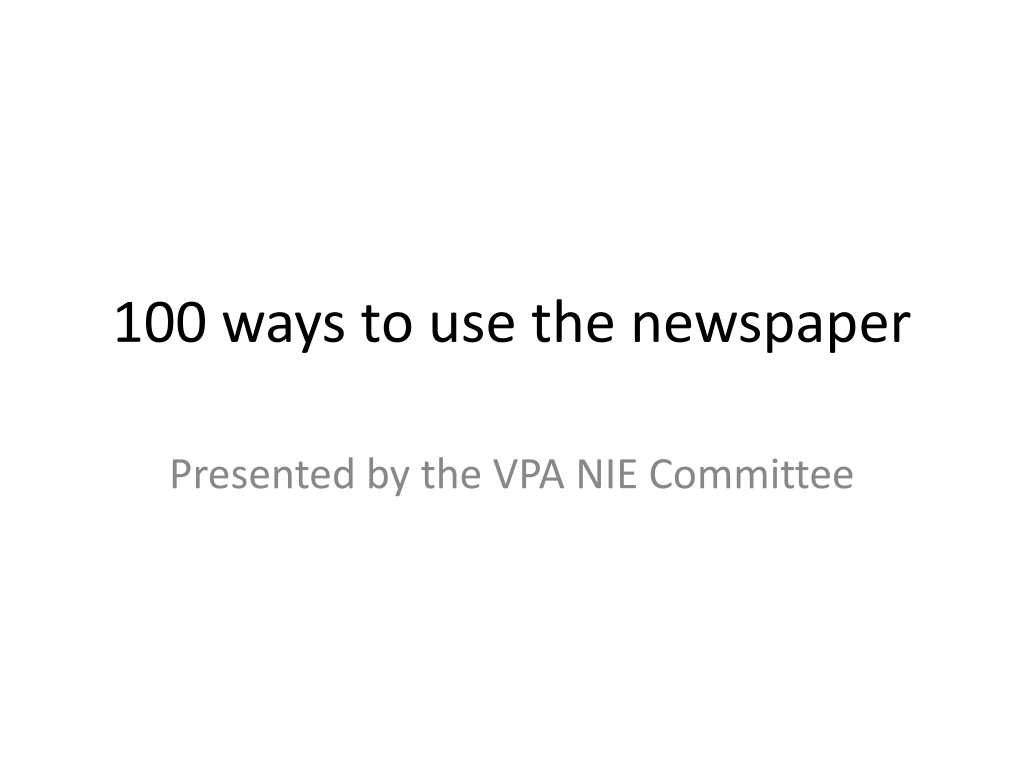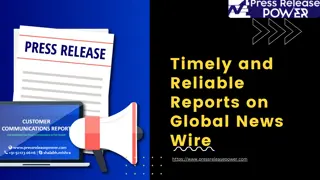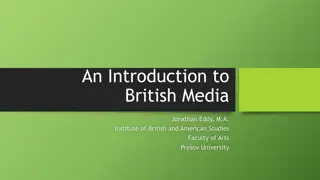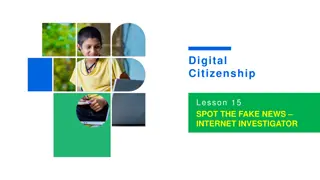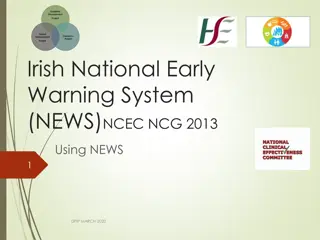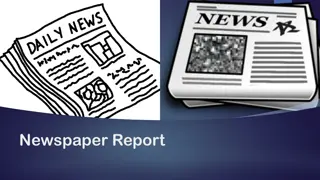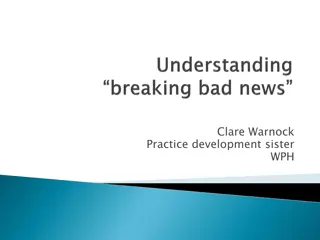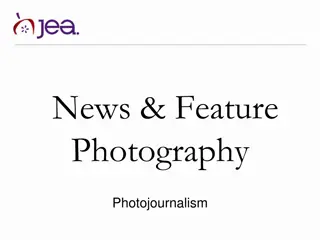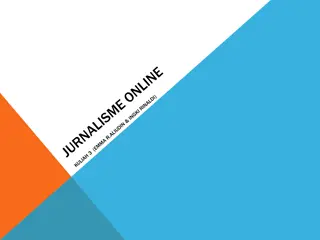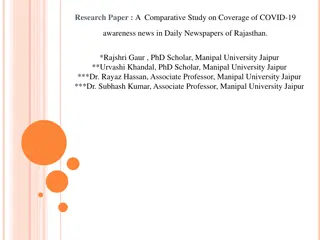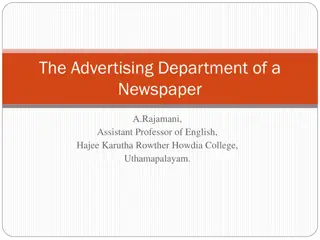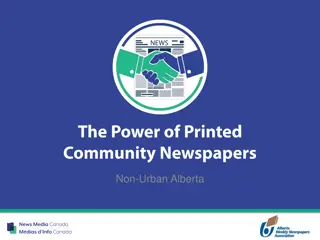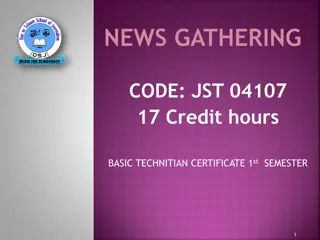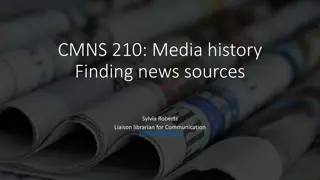Exploring Science and News through Newspapers
Delve into the world of science and journalism with these 100 creative ways to use newspapers. From learning scientific vocabulary to analyzing advancements in technology, this guide offers engaging activities like creating a scrapbook on conservation and making graphs based on weather forecasts. Discover the inner workings of newspapers, from editorial processes to classified ads, and ponder the role of newspapers in a digital age. Uncover the diverse beats covered by reporters and explore the impact of editorials on readers' perceptions. Embrace the interactive learning experience presented by the VPA NIE Committee's insightful suggestions.
Download Presentation

Please find below an Image/Link to download the presentation.
The content on the website is provided AS IS for your information and personal use only. It may not be sold, licensed, or shared on other websites without obtaining consent from the author. Download presentation by click this link. If you encounter any issues during the download, it is possible that the publisher has removed the file from their server.
E N D
Presentation Transcript
100 ways to use the newspaper Presented by the VPA NIE Committee
Science Begin a vocabulary list of science words found in your newspaper. Record the spelling, meaning and the use of each word. Some examples might be: exploration, narcotics, energy, pollution, preventative, analysis, comet, weather, antibiotic, invention, alcoholism, theory, artificial, transplant, medicine, etc. Using your newspaper, collect advertisements for products that were not available 20 years ago. Can you identify the scientific advances that have made this product possible? Find newspaper articles, advertisements, etc., about equipment that will help conserve energy such as storm windows or home insulation. What claims are made about saving? Find a picture of an animal that you would like to be! Identify the animal by its genus and species then write an article pretending you are that animal. Make a "first" notebook. Use newspaper articles about science "firsts" or discoveries. Make a scrapbook of pictures and news stories about conservation. Look for articles about hunting and fishing seasons, tree planting, energy crisis, etc. Make a poster from pictures, advertisements and articles showing how machines help people do different things. Check today's weather map. Find the longitude and latitude of the regional city with the highest temperature and the national city with the lowest temperature. Make a graph that illustrates how many cities have a clear, cloudy or rainy forecast. Find articles in your newspaper about areas that have experienced severe weather. Discuss how stories such as these can help us prepare for weather emergencies. Using the movie listings in the Extra section, count the number of movies advertised in one theater according to ratings - G, PG, PG-13, R. Make a pie graph that represents the number of movies in each ratings group expressed as a percentage.
Newspaper Knowledge According to the index, what pages are the following found on: classified ads, sports, editorials, local news, weather, the crossword puzzle? Find the following information: the telephone number would you call and the starting weekly cost for a home delivered subscription to Your newspaper. The name of the editor and publisher of your newspaper. A comic strip showing a working woman. The score from a local sporting event. The names of three wire services used by your newspaper. Clip and label an example of each of the following: index, byline, cutline, dateline and headline. Find a newspaper article that is about each of the following: a meeting of a government agency, a press conference, a disaster or unexpected happening, the schools. Find five stories from different cities in Virginia. Then find five stories different states and five stories from different countries. Locate each of these cities, states and countries on a map. Project yourself into societies in which there are no newspapers. Make a list of all the functions provided by the newspaper, including such things as providing news, serving as an advertising medium, social announcements, upcoming events, critical reviews, etc. How would each of these functions be met in a newspaperless society? Scan your newspaper and name some of the beats covered by reporters. If you were a reporter, what beat would you like to cover and why? Make a chart showing examples of the vocabulary variations that appear in different sections of the newspaper. For instance, the jargon used by the food editor and sports editor would probably be quite different. In Your newspaper, find examples of editorials that are written to: inform the reader, interpret the news for the reader, entertain the reader, and influence the reader. Use the classified section to buy materials or hire services to help you cross the following barriers: a snake pit, a barbed wire fence, a 10 foot wall, a 20 foot deep moat with snapping crocodiles, an angry giant. Compare your selected products and services with your classmates.
Language Arts Use the front page of your newspaper to draw a circle around every blend. Make a list of all the blends you find. List all the different punctuation marks used in a news article. Read the articles aloud and notice the influence of your voice in determining the place of punctuation. Is a photo really worth 1000 words? Cut a photo out of the newspaper. Write a new caption and article about the action going on in the photo. Find newspaper examples of paragraphs written in present, past and future tenses. Circle all the singular nouns and pronouns in a news article in red and all plural nouns and pronouns in blue. Identify as many sets of antonyms, homonyms and synonyms as you can by scanning the headlines in your newspaper. Collect pictures from the newspaper that shows different facial expressions. Label each picture with descriptive words. Select three headlines from your newspaper and rewrite them as complete sentences. Find examples of ten plural words in your newspaper. Write the root word next to each of the plural words you find. Look at a photo in the sports section. Without reading the story, write down what is happening in the photo, what happened during the game, and who won the game. Read the story. Were your predictions correct?
Math Race through the newspaper! You have five minutes. See how many numbers from 1-25 you can find. Circle each number as you find it. Circle the largest and smallest numbers on a page. Subtract the two numbers you have found. Add the two numbers. Use recipes from your newspaper to practice using fractions. Double the recipe; halve the recipe and triple the recipe. Cut words from the newspaper that relate to quantity. For example: all, none, many, few, fewer, more, less, most etc. Write a word problem that uses an advertisement as its basis. Let a friend try to solve the equation. Look at the movie ads in the features section. Assuming a 15-minute break between shows, determine the duration of three movies. Choose any three digit and any two digit numbers from Your newspaper. Do the following: Find the product of the two numbers Find the sum of the two numbers Find the difference between the two numbers Find the quotient of the two numbers to the nearest hundredth Now, find the sum of all the answers above Read a page in your newspaper and underline words and phrases that refer to time such as: annual, bicentennial, 90-day warranty, next week, etc. Refer to the Extra section and choose the kind of entertainment that you would enjoy most and the place you would most like to eat. Determine the total cost of your outing for one person, for two and for your family. Add up the total points scored by AFC teams in the NFL on any given Sunday or determine the total elapsed time between the first and last place Nascar driver.
Critical Thinking Choose one story from the front page of today's newspaper. Find the answers to these questions: Who? What? When? Where? Why? Note the organization of details in this story. Which is the most important? Where is it found in the story? Does the headline highlight the most important fact? If not, where did the information for the headline appear in the story? Choose an editorial from the editorial page in Your newspaper and underline each fact and circle each opinion. Discuss the logic of the ideas and the organization and development of the arguments. Look at a feature article closely to see what words and sentences help to make you have certain feelings about the article. Make a list of these words and sentences. Imagine that you are in charge of preparing a time capsule that will be opened in 200 years. Cut items that you think would tell the most about our lives today from the newspaper. Compile a list of words that you are not familiar with in your newspaper reading. Make a crossword puzzle using these words with your definitions.
Social Studies Place news items or pictures about each state on a large outline map of the United States. See how many states you can find in the news in two weeks. Chart community crimes for one-week using reports and articles in your newspaper. Chart the type of crime, age of the criminal, location, etc. Travel by means of the newspaper. Clip pictures of a country. Find articles and check the weather page for weather conditions in your chosen country. Then write a story about the things you might do and see if you visited that country. Write an editorial on a topic of controversy for the period of history you are studying. Study some of the editorials in today's newspaper before doing this activity. Research good and bad relationships between the United States and other countries. Try to categorize the reason these relationships may exist. Using your newspaper, give some names and titles of international and political leaders. Describe their roles, as you understand them from articles you have read. Read an article or editorial in your newspaper. Draw a political cartoon that represents the article. Find and read newspaper articles concerning pollution, overpopulation or major social problems. Make a list of the various items or the social problem you have selected. List some reasons that these articles are carried in the newspaper. Prepare a poster or write an essay telling how you would deal with solving this social problem. Use news stories to teach new words related to geography, such as delta, monsoon, panhandle, harbor and terrain. Discuss the way the words are used in newspaper stories. Find examples of the Bill of Rights in action as expressed in articles in your newspaper. What articles would not be in the newspaper if we didn t have freedom of speech or the right to a fair trial?
Life Skills Draw a rough floor plan of a home. Collect newspaper pictures of furniture and appliances to fill the home and make it comfortable. Determine the approximate cost of furnishing a home by using classified ads. Make a chart that is divided into four parts: spring, summer, fall, winter. Cut out pictures of clothing you would wear during each season. Paste the pictures under each word. Prepare menus using food advertisements in the newspaper. Example: Christmas dinner, Italian dinner, etc. Make sure that you include something from all four-food groups. Collect articles of accidents that have happened in the home. Tell how the accidents could have been prevented. Select a job in the classified section of your newspaper. Write a letter to the Human Resources director of your chosen job stating what qualities make you perfect for that job. Check the salary levels for unskilled workers in the help-wanted section of the classified ads. Compare the salaries to those for skilled laborers or professional positions. What are the differences and why? Find a recipe in the food section of your newspaper. Examine the recipes ingredients to see if it includes enough of the nutrients necessary for a balanced diet. What other foods or recipes could you add to make a balanced meal? Go on a scavenger hunt in your newspaper. Find and circle the following items: the price of a used Ford truck, the name of the president of the United States, a TV show that starts at 8PM, the high temperature of a city in Virginia, a sports score, an index. Look at the grocery ads in your newspaper and find an example of multiple products sold for one price (example: 3 ears of corn for $2.00). What is the cost of each item? Is a larger quantity of an item always the better value? Find an example of a comic strip in the Extra section of your newspaper that shows two coworkers or an employee and manager having a conflict. Rewrite the comic strip depicting a better way for the characters to handle the disputed situation.
Character Education Make a Hall of Fame, Hall of Shame poster of bulletin board. Clip articles and cartoons of people who are exhibiting good character traits. Place these under the Hall of Fame heading. Place examples of people not using good character traits under the Hall of Shame heading. Go through Your newspaper and make a "survival vocabulary list" of words that a person would need to know to be a good responsible citizen in today's world. Be sure to list the legal terms you find that we assume all people understand. Read an article in your newspaper about an individual who is honest. What has the honest act? What were the consequences of the act? Would you have made the same decision? Make a family crest that shows examples of what is good about yourself and your family. Look through today s paper and cut out words or pictures that remind you of what you like about your family. Paste them on a sheet of paper. Look through Your newspaper for an article that shows individuals, groups or nations involved in a conflict. Write down the different sides, and what seems to be the reason or reasons for the conflict. Think of as many different ways as you can that they might resolve this conflict. Write a letter to the editor that explains how the groups or nations can resolve their conflict. Would these groups need courage, kindness, forgiveness, and patience? What other character traits would they need to exhibit to solve their conflict?
Elementary Find as many synonyms for "Win" and "Lose" as you can. Circle five verbs located in the Sports section of your newspaper. Take turns acting these words out to see if your classmates can guess the words you chose. Using the television show listings in the features section, graph the number of comedies, news shows, dramas and documentaries airing between 8PM and 11PM. Using the classified ads, find prices of cars that are equal to, greater than, or less than $9999.00 Locate the statistics from games in the Sports section. Graph the total number of yards rushed, homeruns hit, passes thrown, etc. in a single game. Read articles in your newspaper about court cases. Compare the structure of our court system with the judicial system created by the Ancient Romans. Skim the articles and photographs on the front page of your newspaper. Rank each news items in order of importance. Why did the news stories get the news placement that they did? Scan your newspaper for articles about someone what has broken a law. How would you feel if you were the lawbreaker, the victim, the lawyer or the judge? How would you rewrite the article from the point of view of one of those people? Select six headlines from the pages of your newspaper. Cut apart the words from those headlines. Using your words, create new sentences. Identify the noun, verb and adjective in each. How many complete sentences can you create? Look through the pages of your newspaper to locate something you can see, something you can smell, something you can taste, something you can hear, and something you can touch.
Middle School Using a ruler, figure out the percentage of space on a given page for ads, pictures, stories and headlines. On the front page of your newspaper, circle all the numbers you can find and give the range. Determine also the mean, median and mode. Over a period of several weeks, clip articles that deal with problems and/or issues facing your local city government. Discuss the reason for these problems, and how the government hopes to solve them. Find a news article written in past tense. Clip it out of the paper and rewrite it in present tense. Research the area of drugs, tobacco or alcohol, and write an article that informs the local readers of the dangers of one of the substances. Look in the classified ads to find job listings for the medical/health professions. What is the median pay range? Job requirements? Educational requirements? Benefits? Opportunities for advancement? Look for slogans used by businesses in their advertisements. What is the reason for these slogans? Are they believable to you? To whom do they appeal, and what propaganda devise is used? Make up five businesses and write slogans for them. What are the qualifications a person should have to hold public office? Make a list, and then see how the current office holders of candidates stack up. Use articles from your newspaper and other sources to find out about previous jobs, experiences, and other factors that make each candidate or office holder prepared to serve as an elected official. Select three apartments listed in the classified ads for rent section. For each of the following, compute the total rent for a year. Determine the average monthly rent based on the apartments you have chosen. Which of the three apartments you have chosen appears to be the best choice for the money and why? Scan through Your newspaper and list ten occupations which are discussed. Don't use your classified advertisements for this activity!
High School Look for a grocery ad with a soft drink advertisement. Figure out how many fluid ounces are in the eight bottle carton or six pack, and break it down into pints, quarts, gallons and liters. Every week, check through the job listings and put a red X through those jobs that could not be filled by a high school dropout. Put a black X through those that could not be filled by a person with a technical school or college training. Discuss your findings. Choose an editorial and read it carefully. Decide which statements or parts of the statements are facts, which are opinion, and whether or not the tone of the editorial is conservative or liberal. Watch for upcoming issues to see if there is any reaction to the editorial on the letters to the editor page. To improve map skills and stimulate interest in current events, follow the route of a government official as he travels around the country or around the world. Show the route he or she takes on a map with a marker or pushpins. Find the area of the floor in your classroom or library. Using a carpet or tile ad from your newspaper, compute the cost or carpet or tile the room. If the carpet was offered at a 20% discount, what would the cost of the carpeting be? After skimming your newspaper each day, select the important news story of the day and post it on a bulletin board. At the end of the week, have the class vote on the most important story of the week. Look in Your newspaper for articles about countries at war. Use newspaper archives and reference books to look for the same topic 3 or 5 years ago - what has changed, been resolved or worsened over the past 3 to 5 years? Have a discussion of employment trends and demands in your community, based on the help wanted section of the classified ads and any related articles. Study the periodic chart of the elements, and then take a red magic marker and mark the appropriate chemical symbols found in scientific articles in your newspaper. Select a sports story that is of interest to you, and rewrite passive voice sentences into active voice.
